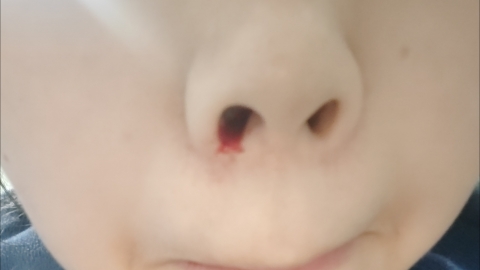Why do I experience nosebleeds every few days, and what should I do?
Generally, recurring nosebleeds every few days may be caused by repeated nasal mucosal injuries, dehydration and dryness in the body, abnormal blood clotting function, chronic rhinitis, nasal polyps, and other related factors. It is recommended to seek timely medical attention to determine the exact cause and then improve the condition under a doctor's guidance through general treatment, medication, surgical intervention, and other approaches. A detailed analysis is as follows:

1. Repeated Nasal Mucosal Injury: Frequently picking the nose or blowing the nose too hard can cause repeated cracking of wounds on the nasal mucosa, leading to a vicious cycle of bleeding. Immediately stop picking the nose, gently blow when necessary, and pinch the nostrils with fingers to apply pressure and stop the bleeding during a nosebleed. After the bleeding stops, applying erythromycin ointment can help protect the mucosa.
2. Dehydration and Dryness in the Body: Insufficient water intake over a long period or a dry environment can leave the nasal mucosa dehydrated, making capillaries prone to rupture and causing nosebleeds, often accompanied by dry lips. Ensure a daily water intake of 1500–2000 milliliters, use a nasal spray with normal saline to maintain moisture, and place a humidifier indoors to maintain proper humidity.
3. Abnormal Blood Clotting Function: A reduced platelet count or deficiency of clotting factors can impair the blood's clotting ability, resulting in recurrent nosebleeds, which may also be accompanied by skin bruising. Patients may take medications such as tranexamic acid tablets, vitamin K1 tablets, or etamsylate tablets as directed by a physician to improve clotting function, while also actively treating the underlying condition.
4. Chronic Rhinitis: Long-term inflammation irritates the nasal mucosa, leaving it in a state of congestion and swelling, making it prone to repeated bleeding, often accompanied by nasal congestion, runny nose, and other symptoms. Patients may use medications such as budesonide nasal spray, mometasone furoate nasal spray, or Tongqiao Biyan tablets as directed by a physician to control inflammation.
5. Nasal Polyps: The mucosal surface of nasal polyps is fragile and prone to recurrent bleeding when irritated by airflow or secretions, which may also be accompanied by reduced sense of smell and nasal congestion. Smaller polyps can be treated with medications such as fluticasone propionate nasal spray, prednisone acetate tablets, or Biyanshu oral solution as directed by a physician to reduce the size of the polyps. Larger polyps may require endoscopic nasal polypectomy to remove the lesion and stop the bleeding.
In daily life, maintain nasal hygiene and avoid exposure to dust and irritating gases. In terms of diet, consume more foods rich in vitamin C, such as kiwifruit and broccoli, to enhance blood vessel elasticity. Regularly check the condition of the nasal cavity to reduce the recurrence of nosebleeds.







